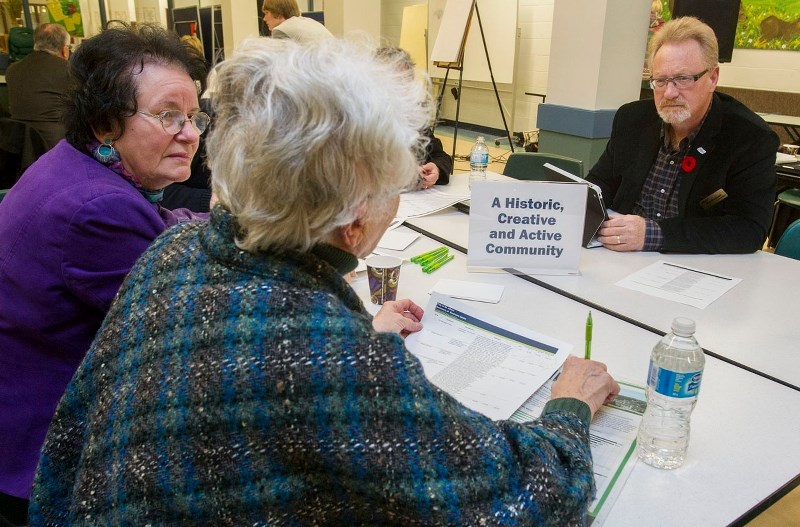Affordable housing, rising utility rates and infrastructure priorities were on the minds of St. Albert residents who attended a public budget session on Wednesday.
About 35 people attended the roundtable session – in person or via webcast – held at Sir George Simpson Junior High to quiz councillors on the proposed 2015 budget and make suggestions.
Sylvia Bilsky was concerned about the "mind-boggling" amount budgeted for new staff and their benefits, adding that she wonders if there are too many managers that form the city's staff.
While she was concerned with rising salary costs, one person suggested that councillors become full-time positions, similar to the mayor.
Utility rates and the recently passed fiscal policy were also hot topics.
Former councillor Malcolm Parker noted the issue of sustainable infrastructure is a problem for communities across Canada, and wanted to know what council was going to do to keep St. Albert's infrastructure running.
"To me this has got to be one of the highest priorities," Parker said, noting that other projects, such as the proposed work at the heritage sites, seem to be more of a want than a need.
Affordable housing came up a few times with suggestions for solutions such as encouraging the development of garage or granny suites, mother-in-law suites and developing the city land purchased to encourage industrial development to bring in more jobs to St. Albert.
City manager speaks
City manager Patrick Draper also offered some insight into the budget during an interview on Wednesday.
City staff is required to prepare the budget according to the policies laid out by council, Draper said. Council is then free to make changes, though it might require changes in policy.
"So council could decide to significantly curtail some existing service or program that is provided to the community if there was an understanding that that service wasn't needed anymore. Council does have that ability," Draper said.
Documentation accompanying the budget notes repeatedly workloads and overtime accumulating in a variety of city departments.
The budget proposes the equivalent of 24.5 full-time positions being added, though Draper notes they would be paid for out of new property taxes collected for the first time in 2015 rather than the current tax base.
Criteria is developed and considered during the budget process to help decide what positions or other money for new projects should be asked for, Draper said.
"These are not just wish list projects," he said.
While there are millions of dollars worth of spending in the 10-year capital plan, Draper notes that council only really buys off on the first year during each budget session.
Currently council is provided a one-year budget, a three-year business plan and a 10-year capital plan each fall to deliberate. Draper would like to move council toward what he calls a real 10-year financial forecast, though he said they're not easy to do.
"We need to get a better sightline on the decisions made today and what are the implications on next year's and future years' budgets," he said.
That means being able to show council the impact of spending money on a new fire hall, which would be a capital budget item, on the operating budget since after it's built they'd have to pay for staff and to operate the building.
The dropping price of oil has been making provincial headlines lately, but Draper said there has been no indication yet that the city should be worried about its provincial grant funds being impacted.
"The province does have reserves set up for those kinds of contingencies," Draper said.
The positive side of oil's falling price is possible cost savings for the city, which had to include escalating fuel costs in the budget, Draper said.
For those wondering what became of their online budget tool input from this summer, Draper said they did consider the results but submissions from the 105 people who completed the survey didn't show any desire to dramatically increase or decrease any particular departments.
Council will start receiving presentations from the city departments Nov. 13. Those presentations will continue over a series of meetings until Nov. 27, when council will begin debate.
Approval of the budget is anticipated on Dec. 15.




